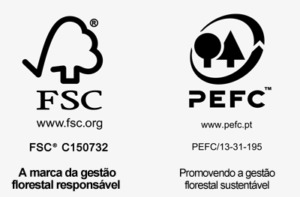Viarco declares its commitment to implement and maintain Chain of Custody Management on wooden items in accordance with the requirements of the FSC® (Forest Stewardship Council®) and PEFC (Programme for the Endorsement of Forest Certification schemes) initiatives.
It intends to ensure that the materials and products from forests and trees that it uses and sells do not originate from controversial sources, considered unacceptable by the PEFC and FSC, such as:
- activities that do not comply with local, national or international legislation applicable to forest management, including, among others, forest management practices; nature and environmental protection;
threatened and protected species; ownership, possession and use rights of land by indigenous peoples, local communities or other affected stakeholders; health, work and safety issues; anti-corruption and payment of applicable fees and taxes; - activities where the capacity of forests to produce a variety of woody and non-woody products sustainably is not maintained, or where harvest levels exceed a rate that can be sustained over the long term;
- activities in which forest management does not contribute to the maintenance, conservation or improvement of biodiversity in the landscape, ecosystem, species or genetic levels;
- activities in which forest areas of high ecological value, that is, forest areas that contain protected, rare, sensitive or representative forest ecosystems; that contain significant concentrations of endemic species and habitats of threatened species as defined in the recognized reference lists; that contains locally endangered or protected genetic resources; that contribute to large global, regional and national landscapes, with natural distribution and abundance of common species, are not identified, protected, or conserved;
- activities in which forest conversions occur (changes by direct human action, from forest to another type of non-forest use or forest plantation), except in justified circumstances where the conversion:
a) complies with national and regional policy and legislation applicable to land use and forest management; and b) does not have negative impacts on forest areas of high ecological value, areas of significant cultural and social value or other protected areas; and c) does not destroy high carbon storage areas; and d) contributes to long-term conservation, economic and/or social benefits.
- activities that do not respect the ILO Declaration on Fundamental Principles and Rights at Work (1998);
- activities that do not respect the United Nations Declaration on the Rights of Indigenous Peoples (2007);
- controversial wood, that is, “Wood that has been traded at some point in the chain of custody by armed groups, whether they are rebel factions or soldiers, or by a civil administration participating in armed conflicts or their representatives, either to prolong the conflict or to using it for its own profit. (…) Controversial timber is not necessarily illegal”, and logging may, in itself, be a direct cause of conflict.; genetically modified trees, ie trees in which the genetic material has been altered in a way that does not occur by natural reproduction and/or recombination, taking into account the applicable legislation that establishes a specific definition of modified organisms.
It also undertakes to comply with social, health and safety at work requirements, ensuring workers the freedom to associate, choose their representatives and negotiate collectively, prohibiting the use of forced and child labor, ensuring equal employment opportunities and treatment, and providing adequate conditions for the health and safety of workers.



